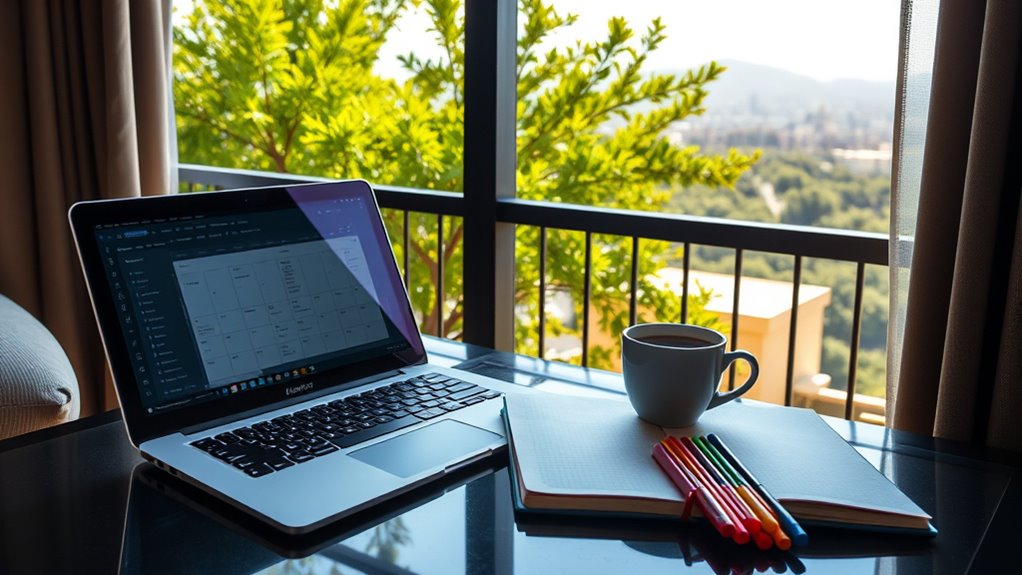During travel weeks, focus on building resilient routines by prioritizing core habits that keep you grounded, like mindfulness and movement. Plan flexible schedules that allow adjustments, pack intentionally with wellness essentials, and incorporate quick exercise or stretching breaks. Stay mindful of hydration, sleep, and nutrition, even on busy days. Reflect on what works, make small tweaks, and stay adaptable to changing conditions. Keep exploring ways to strengthen your routines and handle disruptions effectively.
Key Takeaways
- Establish core habits and use habit stacking to maintain stability amidst travel disruptions.
- Plan flexible itineraries with buffer times and reflect regularly to adapt routines effectively.
- Pack intentionally with portable gear and incorporate movement to sustain energy and well-being.
- Practice mindfulness, deep breathing, and grounding techniques to manage stress during travel.
- Develop micro-routines and stay adaptable by utilizing short pockets of time for quick wellness practices.
Prioritize Your Core Habits

When travel disruptions threaten to throw off your routine, focusing on your core habits becomes essential. By prioritizing these key behaviors, you maintain stability despite chaos. One effective strategy is habit stacking—linkting new habits to existing ones, making them easier to integrate on the go. For example, if you always brush your teeth at a certain time, add a quick meditation or gratitude practice afterward. Enlisting accountability partners can also keep you committed; sharing your goals with someone keeps you motivated and responsible. Even during travel, these core habits serve as anchors, helping you stay grounded and resilient. Incorporating essential oils for resilience can further support your well-being and adaptability amid travel stress. Concentrate on what truly matters, and use habit stacking and accountability to reinforce your routines no matter where you are.
Plan Ahead With a Flexible Schedule
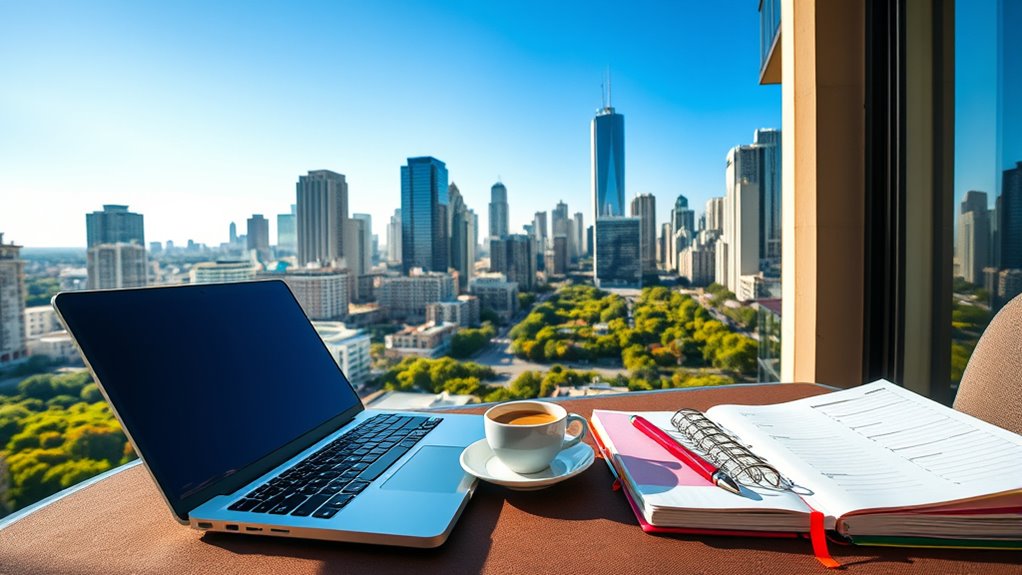
To stay resilient during travel weeks, planning ahead with a flexible schedule is essential. Start by creating a detailed itinerary planning your key activities, but leave room for adjustments. Use travel journaling to note potential changes or new opportunities as they arise, helping you stay adaptable. A flexible schedule allows you to prioritize important routines while accommodating unexpected delays or spontaneous experiences. By mapping out your days in advance, you reduce stress and avoid feeling overwhelmed. Remember, the goal is to maintain consistency without rigidity. Incorporate buffer times between activities and be ready to shift plans as needed. This approach keeps you grounded, enables you to stay productive, and ensures your routines remain resilient, no matter what travel throws your way.
Pack Smart for Wellness and Productivity
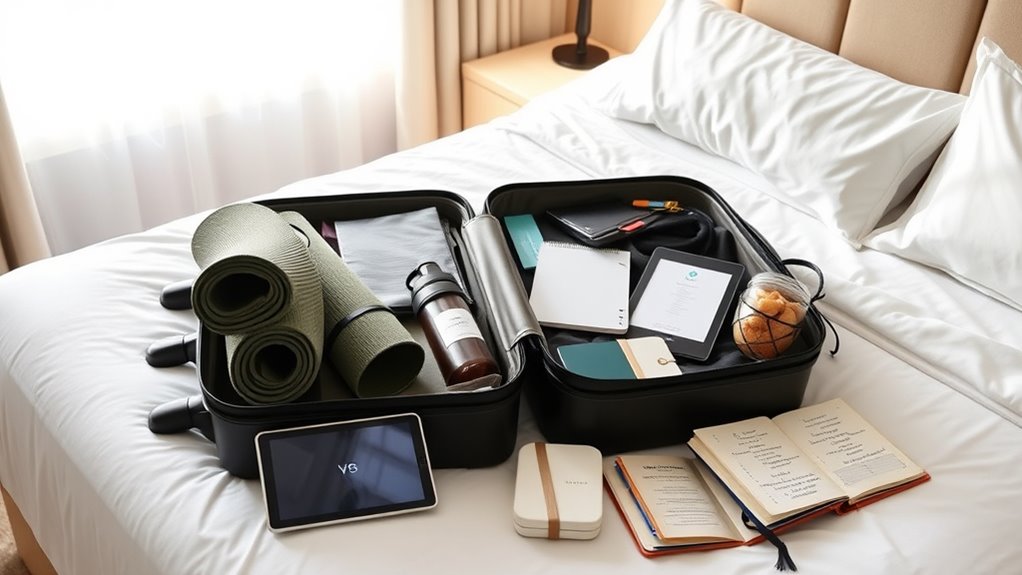
Building a flexible schedule helps you stay adaptable, but packing smart guarantees your routines stay intact even when plans shift. Bring portable gear like compact workout equipment or a reusable water bottle to maintain your wellness routines on the go. Include travel snacks such as nuts, fruit, or protein bars to keep your energy steady and avoid unhealthy temptations. Packing these essentials ensures you can stay productive without relying on unfamiliar or inaccessible options. Keep a small kit with toiletries and chargers handy so you’re ready for any situation. Being intentional with your packing helps you prioritize your health and focus, making it easier to stick to routines despite changes in your travel schedule. Additionally, being aware of grocery savings strategies can help you manage your expenses on the road and stay within your budget. Smart packing is your secret weapon to maintaining wellness and productivity wherever you go.
Find Ways to Incorporate Movement

Incorporating movement into your travel routine keeps you energized and helps combat the fatigue that often accompanies trips. Even short bursts of activity can make a big difference. Consider simple stretching routines to loosen tight muscles after long flights or drives. You can also incorporate strength training with body-weight exercises like squats or push-ups in your hotel room. To stay active:
Small movement breaks boost energy and reduce travel fatigue.
- Do quick stretching routines to improve flexibility
- Walk or bike instead of taxis when possible
- Use hotel gym facilities for strength training
- Take active breaks during meetings or sightseeing
- Remember that city dynamics can influence your activity options and planning
These small adjustments help maintain your fitness and boost your mood. By weaving movement into your day, you’ll feel more resilient, energized, and ready to enjoy your trip.
Stay Connected With Healthy Eating Options
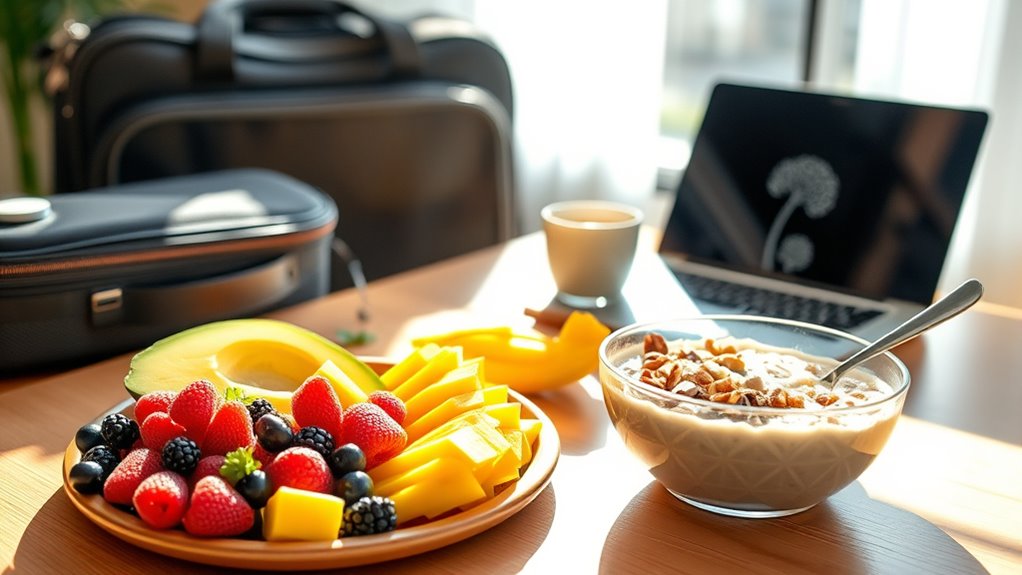
As you keep moving and stay active during travel, paying attention to your eating choices can make a significant difference in maintaining your energy levels. Opt for healthy snack options like nuts, fruit, or yogurt to stay fueled without crashing later. Carrying your own snacks guarantees you have nutritious choices on hand, especially when options are limited. Hydration tips are equally important—drink plenty of water throughout the day to stay alert and prevent fatigue. Avoid sugary drinks or excessive caffeine, which can lead to dehydration. Being mindful of your hydration and snack options helps you stay energized and focused, supporting your resilience during busy travel weeks. Making these small adjustments keeps your routine healthy and sustainable, no matter where your travels take you. Incorporating healthy snack options like gelato or frozen yogurt occasionally can also satisfy sweet cravings without compromising your routine.
Manage Stress With Mindfulness Practices

You can reduce travel stress by practicing mindful breathing techniques to stay centered. Grounding exercises during your journey help you feel more present and calm. Incorporating quick meditation breaks keeps your mind clear and resilient amid busy travel days. Additionally, focusing on stress management techniques can further enhance your relaxation efforts during travel.
Mindful Breathing Techniques
When travel weeks become hectic, managing stress is essential to maintain your well-being. Mindful breathing techniques are simple yet powerful tools for stress management and emotional regulation. They help you stay centered amid chaos and prevent overwhelm. To practice, find a quiet space, and focus on your breath. Inhale slowly through your nose, feeling your chest rise, then exhale gently through your mouth. Keep your attention on each breath to calm your mind. Incorporate these tips:
- Count your breaths to maintain focus
- Use a rhythmic breathing pattern (e.g., 4-4-4-4)
- Combine breathing with visualization to enhance relaxation
- Practice for a few minutes daily, especially during stressful moments
- Understanding the importance of emotional regulation can further improve your resilience during stressful times
These techniques foster resilience, helping you stay composed and balanced during busy travel weeks.
Grounding During Travel
Mindful breathing provides a solid foundation for managing stress, but during busy travel weeks, grounding techniques can offer immediate relief when chaos feels overwhelming. Sensory grounding helps anchor you in the present moment by focusing on your senses—touch, sight, sound, taste, or smell. For quick relief, try identifying five things you can see or hear around you. Incorporate mindful journaling by jotting down your surroundings or feelings, which helps process emotions and regain clarity. These practices shift your focus away from stressors and back to the here and now. When travel gets hectic, grounding techniques become essential tools to maintain calm and resilience, ensuring you stay centered amid the chaos. Spiritual practices like meditation and mindfulness can further enhance your ability to stay grounded and foster a sense of inner peace during stressful times.
Incorporating Meditation Breaks
In the midst of a hectic travel week, taking intentional meditation breaks can considerably reduce stress and restore mental clarity. Incorporating mindfulness meditation and breathing exercises into your routine helps you stay centered amid chaos. You can find moments to pause—whether during a layover or before bed—to focus on your breath. These small pauses sharpen your awareness and ease tension. To deepen your practice:
- Set a timer for 5 minutes of mindful breathing
- Focus on your inhalations and exhalations
- Use guided meditation apps for quick routines
- Practice body scans to release built-up stress
Additionally, practicing Deep Breathing Exercises can enhance your relaxation and focus during busy days.
Create Micro-Routines for Busy Days
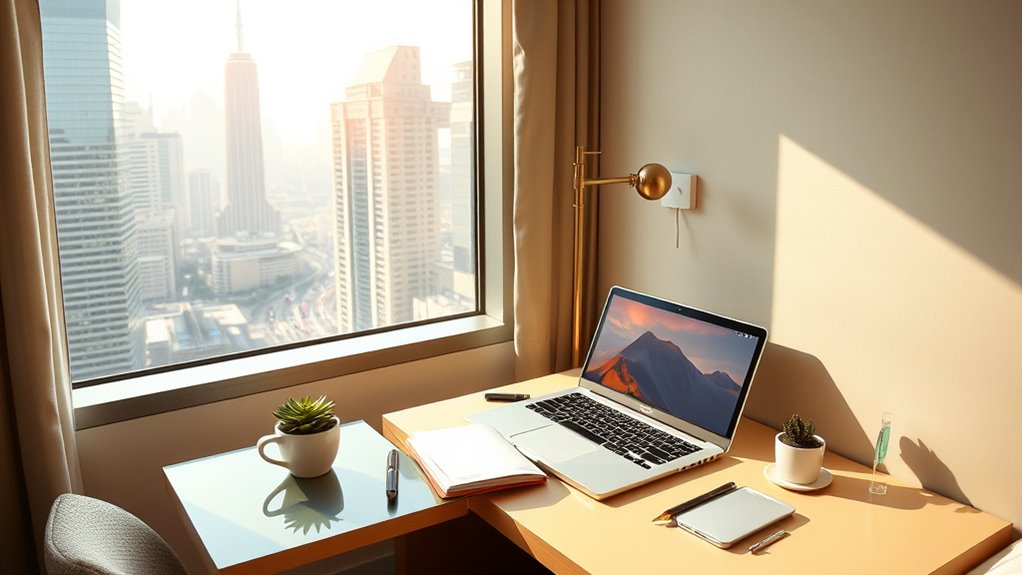
Even on the busiest days, you can maintain a sense of stability by creating micro-routines that fit into small pockets of time. For example, take a few minutes to jot down travel journal tips during a short break, helping you reflect without much effort. Keep quick snack ideas handy so you stay energized without disrupting your schedule. Use these brief moments to stretch or breathe deeply, grounding yourself amidst chaos. These micro-routines require minimal time but can make a significant difference in your mental clarity and routine consistency. By embracing small, manageable habits, you stay connected to your well-being, even on packed days. Incorporating strategies like diversification of routines can help you adapt and thrive during unpredictable travel weeks. Over time, these tiny routines build resilience, helping you navigate travel weeks with greater ease and balance.
Reflect and Adjust Your Routine as Needed
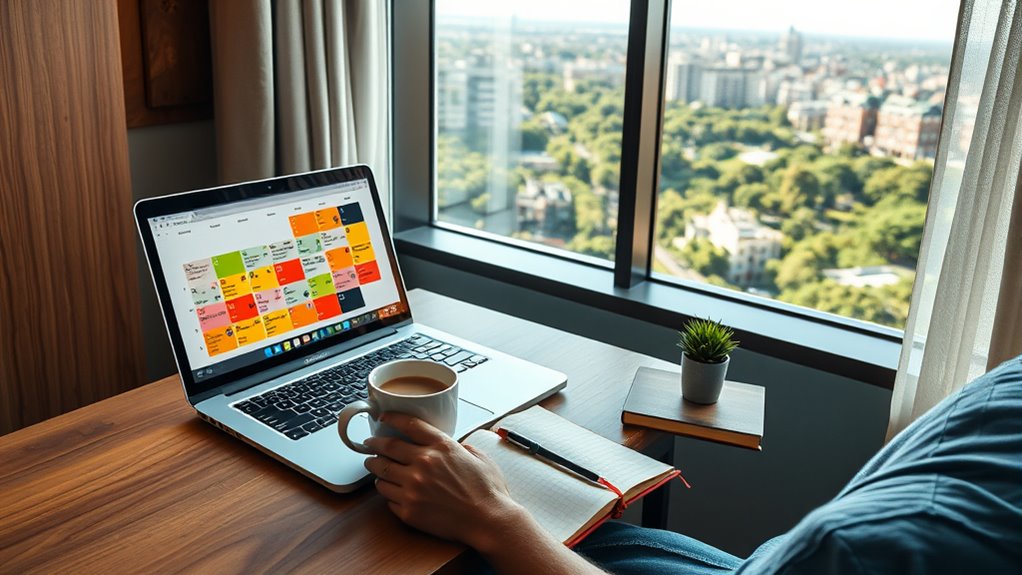
As your travel week unfolds, take time to notice what’s working and what isn’t. Recognize when your needs change and be ready to adapt your schedule accordingly. Making small adjustments helps keep your routine resilient and aligned with your current circumstances. Monitoring your energy levels and overall well-being can guide you in making effective modifications to your daily habits.
Subheading 1: Recognize Changing Needs
When travel plans change, your routine should adapt accordingly. Recognizing your evolving needs helps maintain resilience amid disruptions. Pay attention to signals like fatigue, dehydration, or difficulty sleeping. Adjust your hydration strategies by drinking more water or electrolyte drinks to combat dehydration. Prioritize sleep consistency by sticking to a regular bedtime, even if your schedule shifts. Consider these factors:
- Increased need for hydration during travel
- Altered sleep patterns from different time zones
- Changes in meal times affecting energy levels
- Physical activity variations impacting recovery
Subheading 2: Adapt Your Schedule
Travel disruptions often require you to reevaluate and modify your daily routine to stay resilient. Keep a travel journal to track how your schedule shifts and what works best. Use it to reflect on your energy levels, productivity, and overall well-being. When plans change unexpectedly, adjust your sightseeing planning to fit new timeframes or priorities. Flexibility is key—don’t hesitate to reschedule activities or skip some if needed. By regularly reflecting and tweaking your routine, you’ll better adapt to disruptions and maintain balance. Remember, resilience isn’t about sticking rigidly to a plan but evolving it to suit your current circumstances. This proactive approach helps you stay centered, even when travel throws unexpected curveballs.
Frequently Asked Questions
How Can I Maintain My Sleep Schedule While Traveling?
You can maintain your sleep schedule while traveling by sticking to good sleep hygiene, like keeping a consistent bedtime and avoiding screens before sleep. To combat jet lag, try adjusting your schedule gradually before departure and exposing yourself to natural light at your destination. Stay hydrated, limit caffeine, and consider using sleep aids if necessary. These steps help you stay resilient and minimize the impact of travel disruptions on your sleep.
What Are Quick Routines to Boost Energy During Busy Travel Days?
Think of your energy as a battery that needs quick recharges during busy travel days. You can boost it with mindful stretching to awaken your muscles and a quick meditation to clear your mind. These small routines are like sparks that reignite your vitality, helping you stay alert and focused. Incorporate them into your day whenever you feel your energy dip, and you’ll keep moving with purpose and resilience.
How Do I Stay Motivated to Stick With Routines on the Road?
To stay motivated on the road, focus on mindset strategies that keep you positive and goal-oriented. Remind yourself why routines matter for your well-being. Find accountability partners, like a travel buddy or coach, to encourage you and share progress. Celebrate small wins along the way, making it easier to stick with your routines. With these approaches, you’ll maintain motivation and stay committed, even amidst busy travel days.
What Tools or Apps Can Support My Travel Routines?
Did you know that 80% of travelers find using apps helpful for staying organized? To support your travel routines, try apps like Todoist or Notion for managing your packing checklist and travel journal. These tools keep you on track, ensuring you don’t forget essentials. They also help you log your experiences, making it easy to maintain your routines and stay motivated, no matter where your travels take you.
How Can I Balance Work Commitments With Wellness Routines While Traveling?
When balancing work commitments with wellness routines while traveling, prioritize stress management by taking breaks and practicing deep breathing. Incorporate healthy snacking to keep your energy stable and prevent unhealthy temptations. Stay active with quick workouts or stretching, and set boundaries for work hours. Planning ahead and staying flexible helps you maintain your routines, ensuring you stay focused and energized despite the travel demands.
Conclusion
As you navigate travel weeks, remember that building resilient routines isn’t just about sticking to plans—it’s about adapting and staying one step ahead. Every small adjustment can make a difference, but the real challenge is knowing when to shift gears. Will your new habits stand the test of unpredictability? The key lies in your ability to stay flexible, mindful, and prepared for whatever surprises lie ahead. The journey to resilience is just beginning—are you ready to take the next step?
